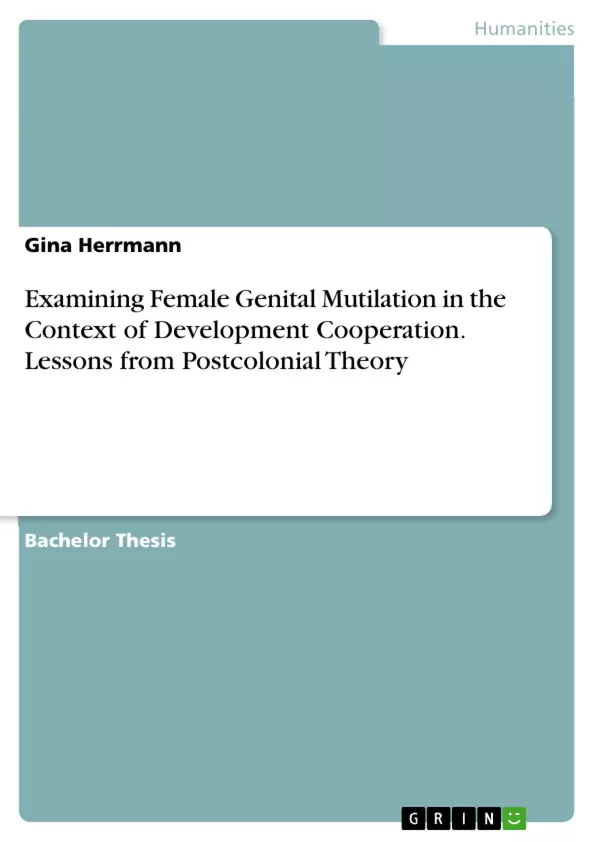This thesis explores the intersection of female genital mutilation (FGM) within the context of development studies and the work of development cooperation organizations and the lessons it can learn from postcolonial theory, specifically examining Gayatri Chakravorty Spivak’s concept of subalternity. Gayatri Spivak is one of the main authors of postcolonial theory with the subaltern, highlighting the voices and perspectives of marginalized and oppressed groups that have been historically silenced. The analysis section focuses on presenting the main objectives of subalternity to examine (1) the discourse surrounding women affected by FGM within development studies and (2) the interventions of international development organizations through FGM-related projects. The role of international organizations will be considered through referencing Phase III and IV (2018-2021 and 2022-2025) of the UNFPA-UNICEF Joint Programme on the Elimination of FGM. To comprehend Spivak’s concept and the responsibility of the development industry and its organizations the main objectives of postcolonial theory and the influence of colonial domination will be touched upon as well as FGM introduced within the scope of development studies. A postcolonial approach in development studies aims to deconstruct Eurocentric perspectives, empower marginalized voices, and reframe development practices by interrogating power dynamics and decolonizing knowledge.
Inhaltsverzeichnis (Table of Contents)
- Introduction
- Topic and its relevance
- Research question and approach
- Literature review
- Development studies
- FGM
- Definition
- In the context of development studies
- Postcolonialism
- Definition
- Development studies from a postcolonial perspective
- FGM from a postcolonial perspective
- Research gap
- Theory
- Subaltern by Gayatri Spivak
- FGM in the context of subalternity
- The role of development cooperation organizations
- Summary
- Most important lessons
- Limitations and outlook
- References
Zielsetzung und Themenschwerpunkte (Objectives and Key Themes)
This thesis aims to examine the intersection of female genital mutilation (FGM) within the context of development studies and the work of development cooperation organizations. It explores the lessons that can be learned from postcolonial theory, specifically focusing on Gayatri Chakravorty Spivak's concept of subalternity. The analysis section delves into the main objectives of subalternity to examine the discourse surrounding women affected by FGM within development studies and the interventions of international development organizations through FGM-related projects.
- The intersection of FGM and development cooperation
- Lessons from postcolonial theory, particularly subalternity
- The discourse surrounding women affected by FGM within development studies
- The role of international development organizations in addressing FGM
- The influence of colonial domination on development practices
Zusammenfassung der Kapitel (Chapter Summaries)
The introduction lays out the topic and its relevance, outlining the research question and approach. Chapter 2 provides a literature review encompassing development studies, FGM, and postcolonialism. It delves into the definition of FGM and its context within development studies, exploring the concept of postcolonialism, including its definition, its application to development studies, and its perspective on FGM. The chapter concludes with a discussion of the research gap.
Chapter 3 delves into the theoretical framework, focusing on Gayatri Spivak's concept of subalternity and its application to the context of FGM. It examines the role of development cooperation organizations in addressing FGM, drawing on specific examples such as the UNFPA-UNICEF Joint Programme on the Elimination of FGM.
Schlüsselwörter (Keywords)
This work centers around the key terms and concepts of Female Genital Mutilation (FGM), development cooperation, postcolonial theory, subalternity, and the discourse surrounding women affected by FGM within development studies. It also explores the role of international development organizations in addressing FGM and the influence of colonial domination on development practices.
- Arbeit zitieren
- Gina Herrmann (Autor:in), 2023, Examining Female Genital Mutilation in the Context of Development Cooperation. Lessons from Postcolonial Theory, München, GRIN Verlag, https://www.grin.com/document/1498033



